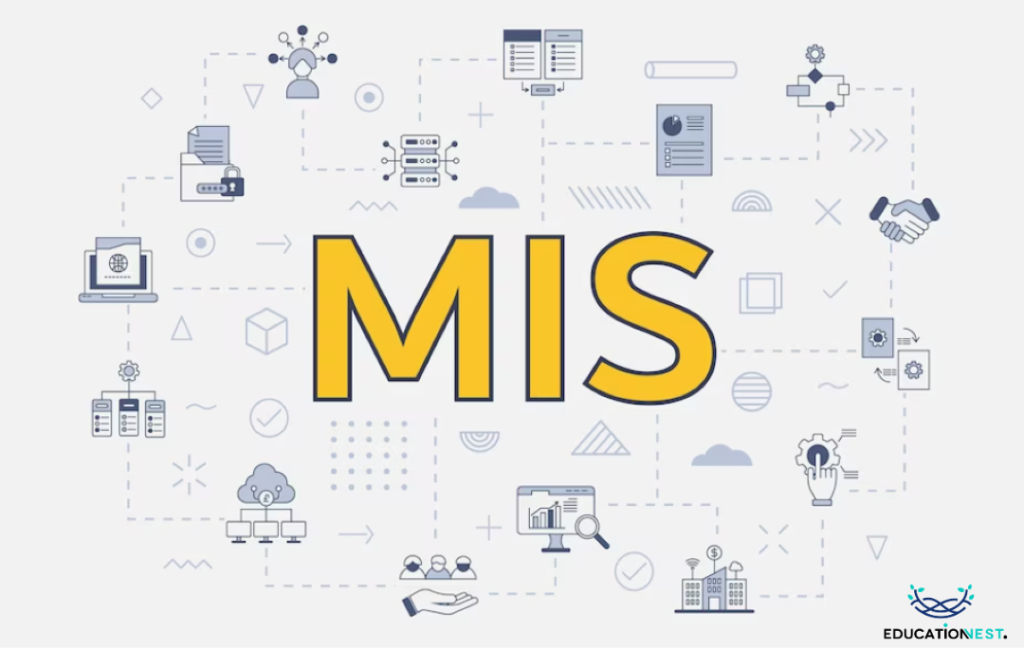
In the ever-evolving landscape of business, effective decision-making is the key to success. This is where Management Information System (MIS) step in, serving as the backbone of informed choices and streamlined operations. In this comprehensive guide, we’ll unravel the intricacies of MIS, exploring its definition, types, characteristics, roles, advantages, and the vital process it follows.
MIS Definition
Let’s kick things off by demystifying the acronym. Management Information System, or MIS, is not some cryptic code only decipherable by IT wizards. In essence, MIS is a structured framework that processes and manages data to support decision-making and control within an organization.
What is a Management Information System?
Imagine MIS as the brain of an organization, processing information from various sources and transforming it into actionable insights. It encompasses hardware, software, personnel, data, and procedures, working harmoniously to facilitate efficient communication and streamline processes.
Types of Management Information System

MIS isn’t a one-size-fits-all solution. It comes in various flavors, each catering to specific organizational needs:
- Transaction Processing System (TPS): Handles day-to-day transactions like order processing and payroll.
- Decision Support System (DSS): Provides analytical tools for decision-makers.
- Executive Support System (ESS): Offers strategic information for top-level executives.
- Management Reporting System (MRS): Generates regular reports for middle management.
Characteristics of MIS
Understanding MIS goes beyond its definition. Let’s delve into its defining characteristics:
- Data Integration: MIS seamlessly integrates data from different departments, fostering a holistic view.
- User-Friendly: Designed for the layman, MIS ensures that even non-tech-savvy individuals can navigate and utilize it effectively.
- Real-Time Processing: In the fast-paced business world, MIS operates in real-time, ensuring information is up-to-date.
- Security: Robust security measures safeguard sensitive information, keeping it away from prying eyes.
Role of MIS
MIS wears many hats within an organization:
- Decision Support: Assists decision-makers by providing relevant and timely information.
- Resource Management: Optimizes resource utilization by tracking and managing assets efficiently.
- Strategic Planning: Facilitates long-term planning by offering insights into market trends and internal performance.
Advantages of Management Information System
Now, let’s talk about the perks:
- Enhanced Decision-Making: MIS empowers decision-makers with accurate and timely information.
- Improved Efficiency: Streamlines processes, reducing manual efforts and minimizing errors.
- Competitive Edge: Organizations with a robust MIS gain a competitive advantage by staying ahead of the curve.
- Resource Optimization: Ensures optimal use of resources, be it time, manpower, or finances.
Also Read:
The Ultimate Guide to Database Management System
Process of Management Information System
Ever wondered how MIS works its magic? The process involves several key steps:
- Data Collection: Gathering data from various sources, both internal and external.
- Data Processing: Organizing and analyzing the collected data to extract meaningful information.
- Information Storage: Storing processed information in databases for easy retrieval.
- Information Dissemination: Distributing relevant information to the stakeholders through reports, dashboards, and other mediums.
Importance of Management Information System
In a world where information is power, MIS is the driving force behind organizational success. Here’s why it’s indispensable:
- Strategic Planning: Helps organizations chart a course for the future based on informed decisions.
- Improved Communication: Enhances communication across departments, fostering collaboration.
- Risk Management: Identifies potential risks, allowing organizations to proactively address challenges.
- Customer Satisfaction: By optimizing processes, MIS contributes to better customer service and satisfaction.
Conclusion
In wrapping up our journey through the intricate world of Management Information Systems, it’s evident that MIS is not just a technological tool but a strategic ally for businesses. Its ability to turn raw data into actionable insights empowers organizations to adapt, evolve, and thrive in today’s dynamic environment. As you navigate the ever-changing seas of the business world, let MIS be your compass, guiding you towards success with the power of information. Remember, in the digital age, the right information at the right time can make all the difference. Cheers to informed decision-making and the endless possibilities that MIS unfolds!

